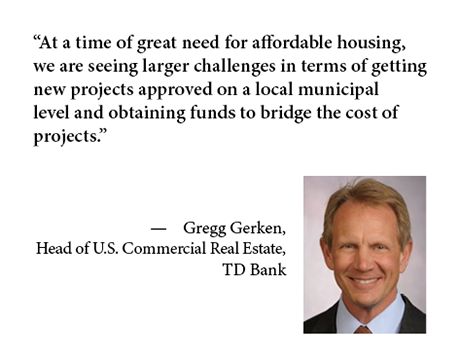The need for affordable housing has grown, but factors like municipal slowdowns and delays in financing have helped contribute to a lack of supply. Gregg Gerken, head of U.S. Commercial Real Estate with TD Bank, spoke to REBusiness about why the need for affordable housing is at a critical juncture and why this need is so difficult to fill.
Finance Insight: What is the state of affordable housing right now?
Gerken: There is a supply/demand imbalance. There continues to be a desperate need for more investment in affordable housing, not less.
The arrival of COVID introduced more challenges for affordable housing, but the struggle to find high-quality affordable rental housing existed well before the pandemic. Rent prices affect millions of Americans, especially those with low incomes, and rents have only increased.
Furthermore, the pandemic has caused an interruption of the supply chain and much-needed new projects have been delayed.
Finance Insight: Can you outline a few big-picture national trends that are most impacting affordable housing right now?
Gerken: As I mentioned, the imbalance of supply and demand is negatively affecting affordable housing. Rising rental rates mean fewer people will be able to qualify for affordable housing.
Coming out of COVID is a critical juncture: inflation is increasing, and the federal stimulus has just ended.
Finance Insight: How has the situation with affordable housing evolved from a year ago, and how have the challenges for affordable housing evolved?
Gerken: I don’t think the situation has changed, at least not for the better. Fewer and fewer units are available for the people who qualify for affordable housing and the income gap continues to widen.
At a time of great need for affordable housing, we are seeing larger challenges (getting new projects approved on a local municipal level and obtaining funds to bridge the cost of projects).
Some new projects are running into funding difficulties, where it is, practically speaking, a challenge to get new projects greenlit and approved.
Finance Insight: How does the need for affordable housing break down geographically?
Gerken: The need for affordable housing (and workforce housing) exists in nearly all areas, regardless of geography. Urban areas are more likely to need affordable housing, because of the elevated cost of living and limited supply.
Finance Insight: How have government programs and policies affected the affordable housing sector?
Gerken: Low-income tax credits and state and municipal resources can positively impact affordable housing by creating more housing available to more families. Fannie Maw and Freddie Mac are committed to funding affordable housing.
— This article is posted as part of REBusinessOnline’s Finance Insight series. Click here to subscribe to the Finance Insight newsletter, a sponsored four-part newsletter series, followed by several video interviews with leading lenders and financial intermediaries, delivered to your inbox in February 2022.


